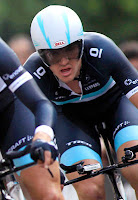 For those of you who don't dress up in spandex shorts and jerseys when you ride a bike, you may have missed a sad cycling story out of Italy this past Monday. During the Giro d'Italia, Italy's premiere stage race, young Belgian rider Wouter Weylandt, 26, lost control of his bike while descending from a steep mountain pass and ultimately lost his life after sustaining massive head injuries.
For those of you who don't dress up in spandex shorts and jerseys when you ride a bike, you may have missed a sad cycling story out of Italy this past Monday. During the Giro d'Italia, Italy's premiere stage race, young Belgian rider Wouter Weylandt, 26, lost control of his bike while descending from a steep mountain pass and ultimately lost his life after sustaining massive head injuries.You may not think of cycling as a sport of fatal crashes, but the truth is, at the speeds these guys are going, it's fortunate accidents like this don't occur more frequently. Weylandt's death is the first death at the Giro since 1986. One sports publication reported Weylandt crashed going speeds "only a car can normally reach."
Accidents, like this one, are caused by a few different problems.
Accidents, like this one, are caused by a few different problems.
If you haven't ridden a competitive bike before, road bikes are designed to go extremely fast. And for those of you who haven't ridden or driven through the mountains in Europe, these mountains are typically much steeper and more dangerous than most mountain passes you'll find in the US. Mountain roads over there are frequently more narrow and aren't nearly as maintained as the road you drive up by your favorite ski resort.
The other problem is race routes send riders up and over remote mountain passes. The more steep and remote the pass, the more challenging and exciting it is for the riders and fans. Race directors look for longer and steeper climbs because intense stages in the mountains separate the great riders from the good riders and fans love watching a guy suffer up a mountain to win a stage.
The downside to big mountain climbs is the backside of the climbs lead to high speed, aggressive descents on bikes designed to carry incredible amounts of speed. In a sport where riders sometimes ride six hours to win a stage by seconds, the risk of flying down a mountain could mean a tremendous reward at the end of the day.
In the States, cycling is a sport mostly observed during three weeks in July during the Tour de France. In Europe, however, cycling is a major sport with lots of fans year round. As long as fans tune in to watch races, tour organizers will continue to search for more aggressive and exciting routes for the riders to ride.
With stage routes becoming more and more difficult, the immense pressure to win a race, and the increasing speeds these bikes and cyclists are capable of, stories like this might be written more often than they should.
For those of you who do get on a bike and head for the nearest hills, remember to stay safe whenever and wherever you ride.
lets hear some personal European biking experiences. That'd be a good read, the Doxology unplugged version of your touring the French Alps.
ReplyDeletei second that
ReplyDeletep.s. i don't want you to crash please
ReplyDelete